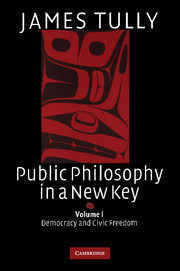9 - A new field of democracy and civic freedom
Published online by Cambridge University Press: 05 September 2012
Summary
INTRODUCTION
This concluding chapter is an attempt to synthesise what has been learned from Part 1 on a new style of public philosophy and from Parts 2 and 3 on case studies of struggles over recognition. As we have seen, over the last forty years the volatile conflicts among individuals, minorities and majorities of diverse kinds have been characterised as ‘struggles over recognition’. Various solutions to how these struggles can be reconciled have been presented by the individuals and groups involved: decolonisation and anti-imperial spokespersons, Indigenous peoples, policy communities, non-governmental organisations, courts, parliaments, states, international organisations, and legal and political theorists. This chapter is a reflection on the field of struggles for and against recognition of various kinds in practice and the cognate field of academic literature that has developed in response to these diverse conflicts. Drawing on the resources of the earlier chapters, it presents a survey of the field of struggles and a synopsis of how it should be studied.
If we stand back and reflect on the recent history of the field of the practice and theory of struggles over recognition, we can see a certain trend. It is not the only trend or the dominant trend, but it is a significant one. This trend can be seen as a learning process undergone to some extent by the actors involved – by citizens engaged in the conflicts on the ground, policy communities in various orders of government, non-governmental organisations, domestic and international courts, and legal and political theorists.
- Type
- Chapter
- Information
- Public Philosophy in a New Key , pp. 291 - 316Publisher: Cambridge University PressPrint publication year: 2008

